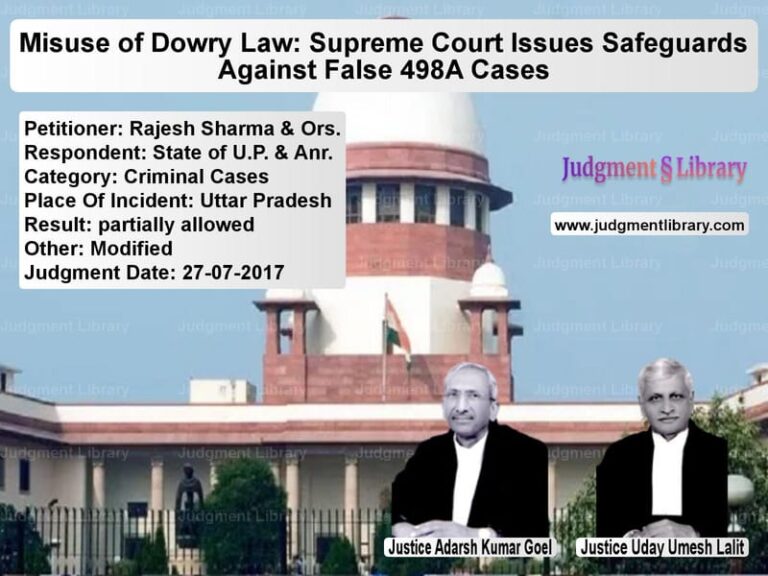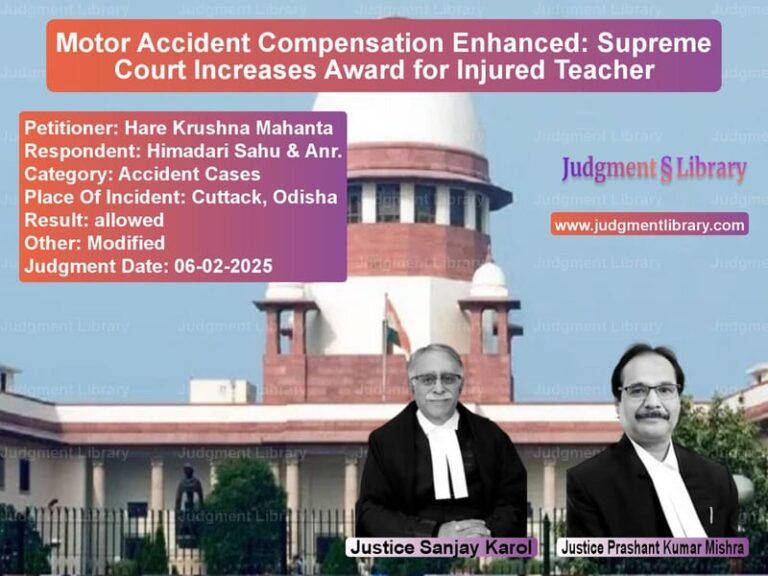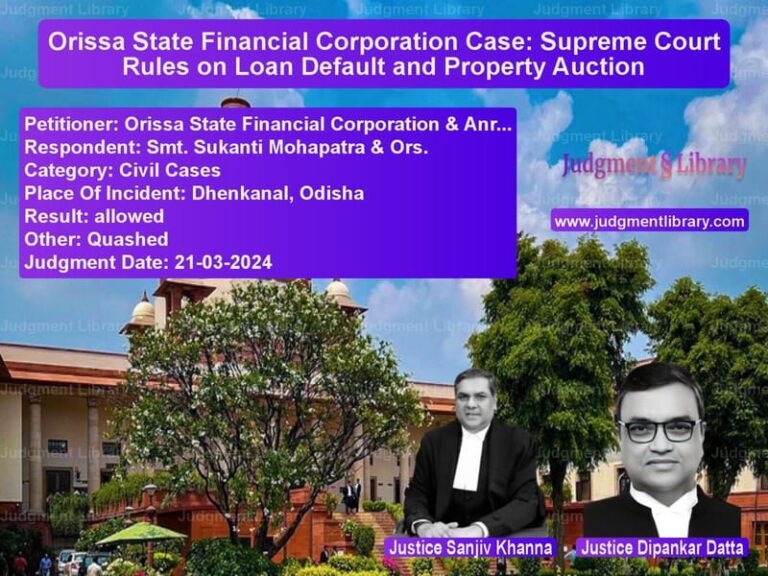Supreme Court Issues Guidelines for Expeditious Disposal of Criminal Cases Against MPs and MLAs
The Supreme Court of India recently delivered a landmark judgment in Ashwini Kumar Upadhyay v. Union of India & Anr., emphasizing the need for swift disposal of criminal cases against elected members of Parliament (MPs) and Legislative Assemblies (MLAs). The judgment, authored by Chief Justice Dr. Dhananjaya Y Chandrachud, establishes comprehensive guidelines to ensure priority hearing and resolution of cases involving legislators.
Background of the Case
This writ petition was filed under Article 32 of the Constitution of India as a public interest litigation (PIL). The petitioner, Ashwini Kumar Upadhyay, sought two primary reliefs:
- Expeditious disposal of criminal cases against MPs and MLAs.
- Review of the constitutional validity of Section 8 of the Representation of the People Act, 1951, which deals with disqualification of convicted legislators.
In this judgment, the Supreme Court focused on the first issue and formulated guidelines for faster adjudication of cases involving legislators.
Legal Issues Examined
- The necessity of expediting trials against sitting and former legislators.
- The role of special courts in handling cases involving MPs and MLAs.
- Whether procedural delays undermine public confidence in democracy.
Petitioner’s Arguments
The petitioner contended that:
- The rising number of pending criminal cases against legislators threatens the integrity of India’s democratic process.
- Delays in trials allow convicted individuals to continue in public office.
- The Supreme Court must intervene to establish a mechanism for expedited trials.
Respondent’s Arguments
The Union of India and State Governments, represented by the Additional Solicitor General, submitted that:
- The proceedings were not adversarial but aimed at institutional reform.
- The government was willing to set up special courts for legislators.
- Financial and administrative feasibility needed to be considered before directing structural changes in trial courts.
Supreme Court’s Analysis
1. Previous Directives on Expedited Trials
The Court referenced its ruling in Public Interest Foundation v. Union of India (2015), where it mandated that trials against legislators under Sections 8(1), 8(2), and 8(3) of the Representation of the People Act, 1951, must conclude within one year from framing of charges.
2. Establishment of Special Courts
Initially, the government proposed setting up twelve special courts across India for such cases. However, after discussions, the Court accepted the amicus curiae’s recommendation that:
- Instead of creating separate courts, existing courts should be designated to hear cases against legislators.
- Each district must assign sessions and magistrate courts exclusively for such trials.
- The state government must notify these courts within two weeks of the High Court’s recommendations.
3. Categorization of Cases
The Court directed that cases be categorized based on the severity of punishment:
- Priority 1: Cases involving death or life imprisonment.
- Priority 2: Cases punishable by imprisonment of seven years or more.
- Priority 3: Other criminal cases.
Cases against sitting legislators must be prioritized over those involving former legislators.
4. Adjournments and Witness Protection
The Court directed:
- No adjournments should be granted except in exceptional circumstances.
- Forensic laboratories must prioritize cases involving legislators.
- Two special public prosecutors should be appointed in each district for handling these cases.
- Trial courts must consider granting protection under the Witness Protection Scheme, 2018 to prevent intimidation.
5. Monitoring by High Courts
The Court mandated:
- Each High Court must register a suo motu case titled “In Re: Special Courts for MPs/MLAs” to monitor the progress of cases.
- A Special Bench, comprising the Chief Justice and a designated judge, must oversee implementation.
- Each Special Court must send a monthly status report to the High Court.
Final Judgment
The Supreme Court issued the following directives:
- The Chief Justices of all High Courts must constitute Special Benches to monitor trials of legislators.
- The High Courts must ensure timely transfers of cases to designated courts.
- Cases pending for over five years must be prioritized.
- Trial courts must hear these cases on a day-to-day basis.
- Information regarding pending cases must be published on High Court websites for transparency.
The Court stated:
“Confidence and trust in elected representatives is essential for an effective democracy. Expeditious disposal of criminal cases against MPs and MLAs is necessary to uphold this trust.”
Conclusion
This ruling sets a precedent for:
- Prioritizing criminal trials against public representatives.
- Reducing delays in cases involving legislators.
- Enhancing public confidence in the judicial process.
- Ensuring timely justice in politically sensitive cases.
With these measures, the Supreme Court aims to prevent misuse of judicial delays and ensure that public representatives are held accountable for criminal offenses.
Petitioner Name: Ashwini Kumar Upadhyay.Respondent Name: Union of India & Anr..Judgment By: Justice Dhananjaya Y Chandrachud, Justice Pamidighantam Sri Narasimha, Justice Manoj Misra.Place Of Incident: India.Judgment Date: 08-11-2023.
Don’t miss out on the full details! Download the complete judgment in PDF format below and gain valuable insights instantly!
Download Judgment: ashwini-kumar-upadhy-vs-union-of-india-&-anr-supreme-court-of-india-judgment-dated-08-11-2023.pdf
Directly Download Judgment: Directly download this Judgment
See all petitions in Fundamental Rights
See all petitions in Public Interest Litigation
See all petitions in Legislative Powers
See all petitions in Separation of Powers
See all petitions in Emergency Provisions
See all petitions in Judgment by Dhananjaya Y Chandrachud
See all petitions in Judgment by P.S. Narasimha
See all petitions in Judgment by Manoj Misra
See all petitions in allowed
See all petitions in Remanded
See all petitions in supreme court of India judgments November 2023
See all petitions in 2023 judgments
See all posts in Constitutional Cases Category
See all allowed petitions in Constitutional Cases Category
See all Dismissed petitions in Constitutional Cases Category
See all partially allowed petitions in Constitutional Cases Category







